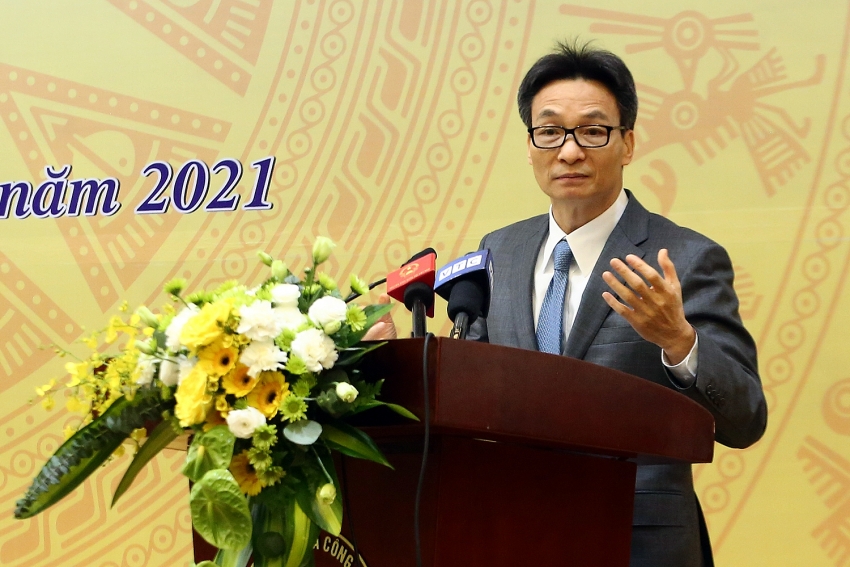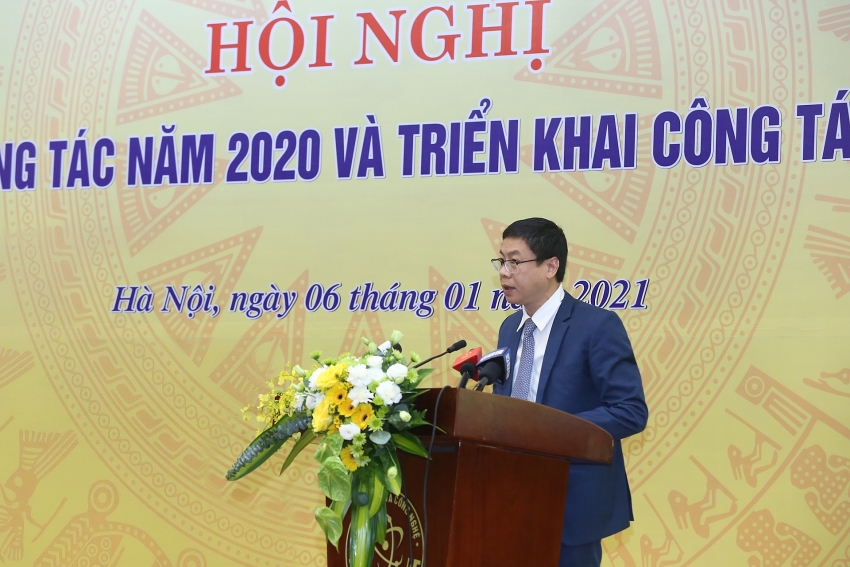Deputy Minister of Science and Technology Le Xuan Dinh made the statement at a meeting held on January 6 to review performance in 2020 and set key tasks for 2021.
According to Dinh, 2021 is an especially significant year for Vietnam as the country begins to implement the 2021-2025 Socioeconomic Development Plan and the 2021-2030 Socioeconomic Development Strategy. The MoST will closely work with other ministries, agencies, and local authorities on a number of key national tasks.
 |
| Deputy Prime Minister Vu Duc Dam |
Addressing the event, Deputy Prime Minister Vu Duc Dam highlighted the achievements of the sci-tech sector. He also pointed out the shortcomingsand asked the MoST to work out the kinks in the mechanisms on tax incentives and investment to encourage investment in sci-tech.
Key tasks in 2021
This year, the MoST will complete and submit to the prime minister the sci-tech and innovation development strategy for 2021-2030, sci-tech directions for 2021-2025; and other key national sci-tech programmes.
 |
| Deputy Minister of Science and Technology Le Xuan Dinh |
Moreover, the ministry will revise the management and financial policies for sci-tech goals and tasks to create a more favourable environment for scientists and businesses to join while effectively implementing the Intellectual Property Strategy by 2030, the programme on the development of intellectual assets by 2030, and amending and supplementing policies on finance and investment to spur research and development activities and innovation.
At the same time, the ministry will complete the draft amendments to the Law on Intellectual Property and submit them to the National Assembly in October 2021.
2020 performance
Looking back on 2020, the deputy minister emphasised that amidst the serious development of COVID-19, the country was pursuing the dual tasks of fighting the pandemic and ensuring socioeconomic development.
Vietnam achieved a GDP growth rate of 2.91 per cent, an impressive figure despite the impact of the novel coronavirus pandemic, making it one of the countries reporting the highest growth in the region and the world. Labour productivity improved at 5.8 per cent annually in 2016-2020 on average.
Also, the country ranked 42nd among 131 economies for the second consecutive year in the 2020 Global Innovation Index (GII). Among the economics with the most significant progress in GII ranking, Vietnam was first among the 29 lower-middle-income countries and third in Southeast Asia, behind Singapore (eighth) and Malaysia (33rd).
The MoST has undoubtedly contributed to these achievements. Last year, the ministry submitted the government 18 documents, issued seven circulars, and collaborated with the Ministry of Finance to issue two circulars. These documents focused on completing policies on sci-tech to facilitate activities and encourage private investment.
In addition, the ministry worked with the Ministry of Culture, Sports and Tourism and the Ministry of Agriculture and Rural Development on the draft amendments to the Law on Intellectual Property. Accordingly, seven policies are proposed to be amended to be aligned with international commitments.
Regarding the tasks assigned by the government, the ministry was assigned 55 tasks and fulfilled all of them. It also took actions to cut administrative procedures, develop e-government, and boost technology applications in management and performance.
Also during 2020, the MoST focused on building and submitting to authorised agencies the policies on increasing capacity to adapt to Industry 4.0, while collaborating with other ministries, agencies, and localities on carrying out the scheme on developing sustainable smart cities in 2018-2025, with a vision to 2030.
The ministry also closely worked with ministries, agencies, and local authorities on preventing and fighting against COVID-19, thus contributing to the country’s efforts to effectively handle the pandemic.
With these moves, many sci-tech achievements have been made, with its role increasing in economic sectors like agriculture, industry, and trade, energy, transport, banking and finances, and healthcare, thus supporting the country in its digital transformation path.

 Previous page
Previous page Back to top
Back to top







